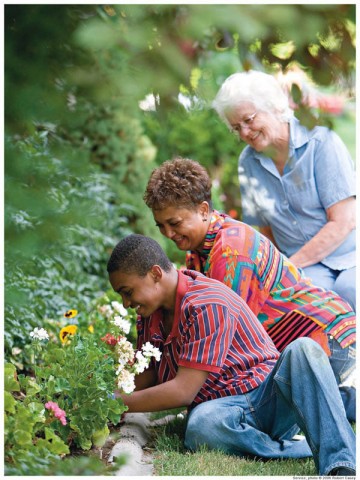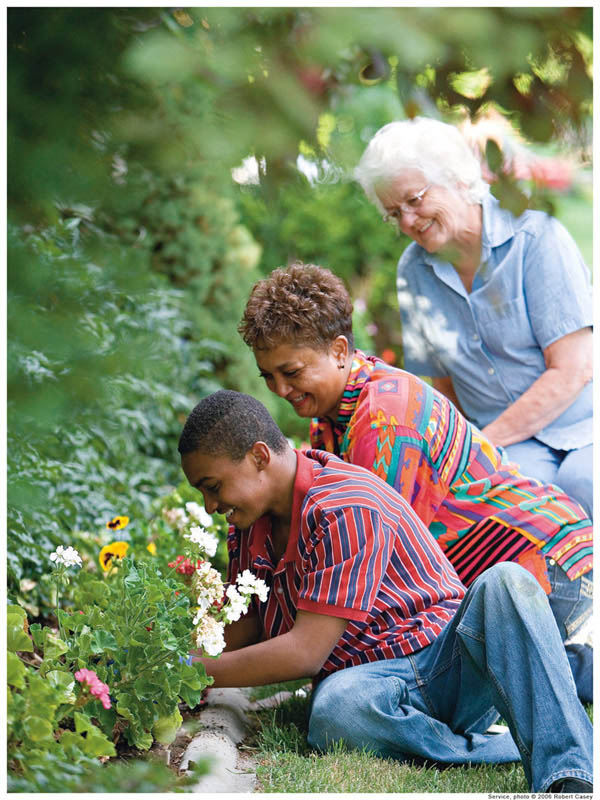A recent study done out of the University of Pennsylvania found that Mormons (a nickname for members of The Church of Jesus Christ of Latter-day Saints) do more volunteer work than any other segment of society. Previous studies have shown that 30-50 percent of people in the United States volunteer and the average time of service is about three to four hours per month. Mormons, on the other hand, donate about 430 hours a year. 242 hours a year were devoted to religious activities. 96 hours were spent on volunteer work done to meet social needs of Mormons. They spent 56 hours a year helping people who were not Mormon but working through their church. An additional 34 hours per year were spent volunteering outside the church completely. This averaged to 8.2 hours per week, meaning Mormons did twice as much volunteer work in a week than most people do in a month.
This far exceeds the level of volunteerism found in other religions or in other groups. The researcher, Ram Canaan, stated that Mormons were the most pro-social people in America.Mormons, at baptism, take on the name of Jesus Christ. They feel this means they must keep Jesus Christ’s commandments and follow His example. He taught that we must love our neighbors as ourselves and serve them. This motivates Mormons to serve others. They know it makes them more Christ-like and their goal is to become as much like Him as possible.
Some of the volunteer work, as shown, is done within the Church for other Mormons. Mormons operate a lay church, which means that everyone volunteers. Nearly every member of the church has a “calling.” This is a volunteer position serving the church. Generally, people do not select their own callings, however. The bishop—a lay pastor overseeing the congregation—offers them a specific position. Normally, the president of an organization will prayerfully select those they want in the position and then give their choice to the bishop. He and those who assist him pray and make a final decision. This is done because the bishop sometimes knows something about the person the other leaders does not, such as a family situation that limits the person’s time or that he or she is already in line for another calling. A member of the bishopric (a bishop and two assistants who are called counselors) offers the calling to the member. The member is free to refuse the calling—although few do—or to offer additional information that might affect the ability to do the calling.
After a person accepts a calling, he or she is sustained by the membership. To sustain the person means to promise to support and help them in any way the members can, which provides a powerful support network for each person.
While it may seem odd to some—the conference in which the volunteerism was discussed mentioned that it was a system largely unparalleled in other religions—the idea of callings is actually very inspired and reveals the wisdom in even the smallest aspects of God’s plan. If a member was to choose a calling, he or she would always choose within his or her own comfort zone. However, Mormons often find themselves called to do something they’ve never done before or that they think they aren’t good at. They are “set apart,” which means they are given a special priesthood blessing through the laying on of hands. Through this blessing, God gives them what they need to do it. Mormons find they can do things they never thought they could do, which improves their self-confidence. Through their callings, they learn new skills or overcome weaknesses. A disorganized person might find herself being a secretary and a shy person may find herself leading a large organization. Someone who always thought she wasn’t good with children finds herself teaching preschoolers. Some of the skills learned through callings are jobs members can take into their employment.
In addition to the skills learned, callings help to build a sense of community and belonging. A person who moves into a congregation meets people quickly through her calling and has a sense of ownership in her congregation. Her contributions make a difference to the success of the congregation, the Church, and God’s kingdom on earth.
Mormons also work through church programs to help those not of their faith. The Mormon Helping Hands program is an example of Mormon-organized community service. Many congregations do a large-scale community service project at least once a year in addition to smaller ones throughout the year. They also step in during a crisis, such as a hurricane, to help people in their community, regardless of faith, clean up after the storm. Teenagers attending their annual conference do projects and most do regular projects during the year as well. The children also perform community service through their Scouting and Activities Day programs. The Relief Society—the auxiliary for the women—runs literacy programs that are open to the public at no cost.
who are not Mormon. The program runs a number of ongoing initiatives as well as emergency disaster assistance or short-term projects. The long-running initiatives include clean water, neonatal resuscitation training, wheelchair funding, efficient food production, and vaccinations. Mormons donate to this program and some retired Mormons volunteer to spend a year or two in a developing nation doing humanitarian work. These humanitarian projects do not involve missionary work and many of the recipients do not know the Mormons provided their help.
Of course, Mormons also serve in programs not run by the church. They are taught by their leaders to be involved in their communities, so many select worthwhile programs in their own towns to assist in. Mormon parents frequently volunteer in their schools and others serve in libraries, food pantries, community leadership and other programs.
All these projects, whether they help their own members or others, strengthen their relationship with Jesus Christ. Service is a critical part of the Mormon experience.
Read the transcript of the conference on Mormon volunteerism that discusses the study.
Learn more about the Humanitarian Aid program.
Learn more about Mormon Helping Hands.


